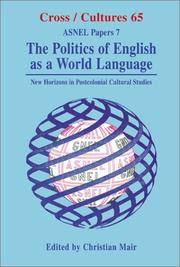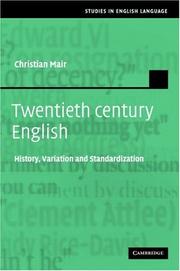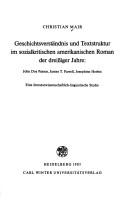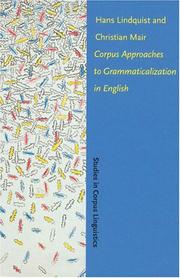| Listing 1 - 10 of 17 | << page >> |
Sort by
|

ISBN: 9042008768 9401200920 1417566655 9781417566655 9042008660 9789042008663 9789042008762 Year: 2003 Publisher: Amsterdam Rodopi
Abstract | Keywords | Export | Availability | Bookmark
 Loading...
Loading...Choose an application
- Reference Manager
- EndNote
- RefWorks (Direct export to RefWorks)
The complex politics of English as a world language provides the backdrop both for linguistic studies of varieties of English around the world and for postcolonial literary criticism. The present volume offers contributions from linguists and literary scholars that explore this common ground in a spirit of open interdisciplinary dialogue. Leading authorities assess the state of the art to suggest directions for further research, with substantial case studies ranging over a wide variety of topics - from the legitimacy of language norms of lingua franca communication to the recognition of newer post-colonial varieties of English in the online OED. Four regional sections treat the Caribbean (including the diaspora), Africa, the Indian subcontinent, and Australasia and the Pacific Rim. Each section maintains a careful balance between linguistics and literature, and external and indigenous perspectives on issues. The book is the most balanced, complete and up-to-date treatment of the topic to date.
English language --- Sociolinguistics --- Anglais (langue) --- Langage --- Germanic languages --- Social aspects. --- Langue universelle --- Politique linguistique
Book
ISBN: 0521370353 9780521370356 Year: 1990 Publisher: Cambridge Cambridge University Press
Abstract | Keywords | Export | Availability | Bookmark
 Loading...
Loading...Choose an application
- Reference Manager
- EndNote
- RefWorks (Direct export to RefWorks)
English language --- Anglais (Langue) --- Clauses --- Discourse analysis --- Propositions --- Analyse du discours --- Langue anglaise --- --Grammaire --- --Discours --- --Analyse --- --English language --- Infinitival constructions --- Complement --- Engels: syntaxis; semantiek --- Infinitival constructions. --- -Engels: syntaxis; semantiek --- 802.0-56 Engels: syntaxis; semantiek --- -802.0-56 Engels: syntaxis; semantiek --- 802.0-56 --- Syntax --- Verb phrase --- Grammar --- Clauses. --- Complement. --- Discourse analysis. --- Germanic languages --- Grammaire --- Discours --- Analyse --- English language - Infinitival constructions --- English language - Clauses --- English language - Complement

ISBN: 0521832195 9780521832199 9780511486951 9780521115834 9780511335211 0511335210 0511333978 9780511333972 051133463X 9780511334634 9786611040284 6611040285 9780511333293 0511333293 110716074X 1281040282 1139130625 0511486952 0521115833 Year: 2007 Publisher: Cambridge Cambridge University Press
Abstract | Keywords | Export | Availability | Bookmark
 Loading...
Loading...Choose an application
- Reference Manager
- EndNote
- RefWorks (Direct export to RefWorks)
Standard English has evolved and developed in many ways over the past hundred years. From pronunciation to vocabulary to grammar, this concise survey clearly documents the recent history of Standard English. Drawing on large amounts of authentic corpus data, it shows how we can track ongoing changes to the language, and demonstrates each of the major developments that have taken place. As well as taking insights from a vast body of literature, Christian Mair presents the results of his own cutting-edge research, revealing some important changes which have not been previously documented. He concludes by exploring how social and cultural factors, such as the American influence on British English, have affected Standard English in recent times. Authoritative, informative and engaging, this book will be essential reading for anyone interested in language change in progress, particularly those working on English, and will be welcomed by students, researchers and language teachers alike.
Historical linguistics --- English language --- Dialectology --- anno 1900-1999 --- taalverandering --- 802.0-024 --- 802.0-024 Modern Engels--(vanaf 16de eeuw) --- Modern Engels--(vanaf 16de eeuw) --- standaardtaal. --- taalverandering. --- Linguistic change --- Change, Linguistic --- Language change --- Language and languages --- Standardization --- Variation --- History --- Dialects --- Engelse taal --- geschiedenis. --- Standardization. --- Variation. --- Arts and Humanities --- Language & Linguistics --- Germanic languages

ISBN: 353303710X 3533037118 9783533037101 9783533037118 Year: 1985 Publisher: Heidelberg: Winter,
Abstract | Keywords | Export | Availability | Bookmark
 Loading...
Loading...Choose an application
- Reference Manager
- EndNote
- RefWorks (Direct export to RefWorks)
Book
ISBN: 3860572717 Year: 1995 Publisher: Tübingen Stauffenburg
Abstract | Keywords | Export | Availability | Bookmark
 Loading...
Loading...Choose an application
- Reference Manager
- EndNote
- RefWorks (Direct export to RefWorks)
Article
Abstract | Keywords | Export | Availability | Bookmark
 Loading...
Loading...Choose an application
- Reference Manager
- EndNote
- RefWorks (Direct export to RefWorks)

ISBN: 9027222843 1588115232 9786612254437 128225443X 9027295484 1423766350 9789027222848 9781423766353 9789027295484 Year: 2004 Volume: 13 Publisher: Amsterdam Benjamins
Abstract | Keywords | Export | Availability | Bookmark
 Loading...
Loading...Choose an application
- Reference Manager
- EndNote
- RefWorks (Direct export to RefWorks)
As a counterexample to unidirectionality in grammaticalization, Newmeyer (1998:270) cites the loss of second-person singular subject clitics, e.g., in hastou and wiltou, in 16th century English (Kroch et al. 1982). These forms are a common, albeit optional, feature of Middle English. Though full thou forms replace -tou/-tow clitics in Early Modern English, second-person plural enclitics, subject proclitics, and object enclitics attest to the continued viability of clisis. This paper argues that -tou/-tow is a reduced form, not a clitic, its disappearance being attributable to loss of a phonological rule, not decliticization. This change predates the replacement of thou by you, the non-expression of subjects in imperatives, and the spread of do in questions and is sudden rather than gradual.
English language --- Grammar --- Pragmatics --- Discourse analysis --- Corpus linguistics. --- Corpuslinguïstiek. --- Engelse taal --- Discourse analysis. --- Grammaticalization. --- discoursanalyse. --- discourse analysis. --- grammaticalisatie. --- 802.0-56 --- 802.0-56 Engels: syntaxis; semantiek --- Engels: syntaxis; semantiek --- Grammaticalization --- English Language --- English --- Languages & Literatures --- Germanic languages --- English language - Discourse analysis --- Discoursanalyse. --- Grammaticalisatie.
Book
ISBN: 9780521867221 9780511642210 9781107410466 0521867223 9780511641640 0511641648 1107210259 1107410460 051164096X 1282386530 9786612386534 0511639201 0511638132 0511640285 0511642210 0511700237 9781107210257 9781282386532 6612386533 9780511639203 9780511638138 9780511640285 Year: 2009 Publisher: Cambridge Cambridge University Press
Abstract | Keywords | Export | Availability | Bookmark
 Loading...
Loading...Choose an application
- Reference Manager
- EndNote
- RefWorks (Direct export to RefWorks)
Based on the systematic analysis of large amounts of computer-readable text, this book shows how the English language has been changing in the recent past, often in unexpected and previously undocumented ways. The study is based on a group of matching corpora, known as the 'Brown family' of corpora, supplemented by a range of other corpus materials, both written and spoken, drawn mainly from the later twentieth century. Among the matters receiving particular attention are the influence of American English on British English, the role of the press, the 'colloquialization' of written English, and a wide range of grammatical topics, including the modal auxiliaries, progressive, subjunctive, passive, genitive and relative clauses. These subjects build an overall picture of how English grammar is changing, and the linguistic and social factors that are contributing to this process.
802.0-56 Engels: syntaxis; semantiek --- Engels: syntaxis; semantiek --- Computational linguistics --- Corpora (Linguistics) --- English language --- 802.0-56 --- Corpus-based analysis (Linguistics) --- Corpus linguistics --- Linguistic analysis (Linguistics) --- Automatic language processing --- Language and languages --- Language data processing --- Linguistics --- Natural language processing (Linguistics) --- Applied linguistics --- Cross-language information retrieval --- Mathematical linguistics --- Multilingual computing --- Grammar --- Analysis and parsing --- Diagraming --- Composition and exercises --- Data processing --- Computational linguistics. --- Corpora (Linguistics). --- Grammar . --- Grammar. --- Linguistique --- Informatique --- Arts and Humanities --- Language & Linguistics --- Germanic languages --- English language - Grammar --- Anglais (langue) --- Corpus linguistique --- Grammaire
Book
ISBN: 9783851241594 3851241592 Year: 1992 Publisher: Innsbruck: Universität Innsbruck,
Abstract | Keywords | Export | Availability | Bookmark
 Loading...
Loading...Choose an application
- Reference Manager
- EndNote
- RefWorks (Direct export to RefWorks)
Book
ISBN: 3825351580 Year: 2006 Publisher: Heidelberg Universitätsverlag Winter
Abstract | Keywords | Export | Availability | Bookmark
 Loading...
Loading...Choose an application
- Reference Manager
- EndNote
- RefWorks (Direct export to RefWorks)
| Listing 1 - 10 of 17 | << page >> |
Sort by
|

 Search
Search Feedback
Feedback About UniCat
About UniCat  Help
Help News
News